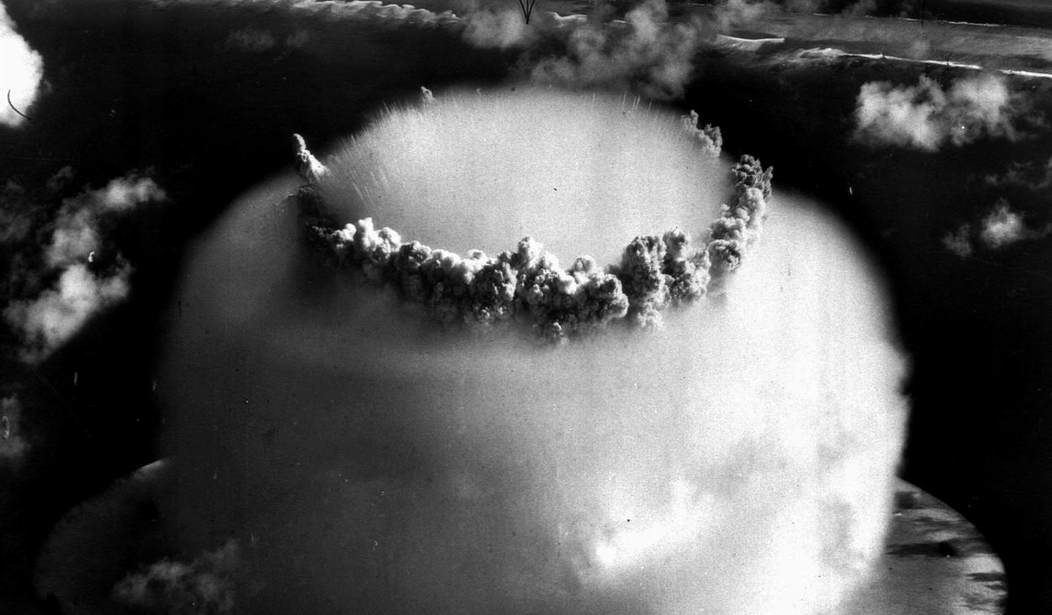Forty-five years ago, there was a nuclear scare that then-President Jimmy Carter, who tried to use the Lyndon B. Johnson playbook and resurrect the near certainty of nuclear war if Ronald Reagan was elected president, threw into the public.
The 1964 Johnson presidential campaign cut what many historians believe to be the most effective (and the most misleading) campaign commercial in history.
Barry Goldwater was not a mad bomber. The evocative commercial was meant to scare people into voting for Johnson. The mainstream press back then called out the Johnson campaign for appealing so basely to the fears and emotions of the American voter."Daisy" aired as a commercial only once, during a Sept. 7, 1964, telecast of the film "David and Bathsheba" on NBC. But it was aired repeatedly on nightly news broadcasts across all three networks for weeks as the Johnson campaign knew it would be.
"Daisy" was an extraordinarily effective ad because the use of nuclear weapons was so unthinkable at that time that anyone like Goldwater, who talked fast and loose about using nukes during his campaign (he suggested using nukes in 1964 to defoliate the North Vietnam forests), was placed outside the mainstream civilized discourse.
Carter was never as explicit in his scare tactics as Johnson was. But Carter's speeches about signing the horrible SALT II treaty that allowed Russia to build as many nukes as fast as possible while putting limits on the U.S. arsenal made it clear that anyone who criticized the treaty wanted nuclear war.
Flash forward 45 years when Russian President Vladimir Putin almost casually lowered the threshold for using nuclear weapons. The move was in response to the U.S. taking the handcuffs off of Ukraine to allow them to use U.S.-built missiles to strike targets deep into Russia.
The psychological barrier to using nuclear weapons is falling. What was once "unthinkable" has become eminently "thinkable." This means that we're entering an age even more dangerous than Goldwater and Johnson's time. The post-Cold War consensus on limiting nuclear arsenals has fallen by the wayside. And as the Wall Street Journal points out, "Treaties are collapsing, some nuclear powers are strengthening their arsenals, the risk is growing that nuclear weapons will spread more widely and the use of tactical nuclear weapons to gain battlefield advantage is no longer unimaginable."
In truth, treaties were never very effective in containing Russia when it was Communist or now that Putin is in charge. It's not clear how treaties would contain China, who is so far behind the U.S. (only about 400 nuclear warheads), and Russia that it may be a decade before they can challenge us.
The once and future nuclear threat comes from Moscow. The Russians have more than 4,400 nuclear warheads, while the U.S. has 3,700. Our missile delivery systems are more accurate. Russia's warheads are more powerful.
The Intercontinental Ballistic Missiles (ICBMs) in both nations' arsenals would likely trigger a massive retaliatory response if one side launched. But what about the shorter-range, lower-yield nuclear weapons?
While the U.S. and Russia whittled down their stockpiles, concerns have risen about the use of tactical nuclear weapons. These are weapons with shorter ranges and smaller yields, which could make a big difference on the battlefield in an otherwise conventional war without sparking a wider nuclear conflict.
Moscow has hinted that it might use nuclear weapons in Ukraine and introduced a doctrine in November that made the grounds for potentially using them broader and more explicit. Western powers feared Russia might decide to use tactical weapons in the conflict if it found itself on the defensive.
This is a gray area in our nuclear doctrine. That makes it incredibly dangerous. "Gray areas" are invitations to miscalculate. While it's not likely the U.S. would use a nuke in Ukraine or the Middle East, other nations might. What then? The rulebook is thin when it comes to deciding what to do in the case of a local use of a tactical nuclear weapon.
One thing is certain: any use of nuclear weapons in any theater for any reason would open the door to a brave, new, dangerous, and uncertain world.










Join the conversation as a VIP Member